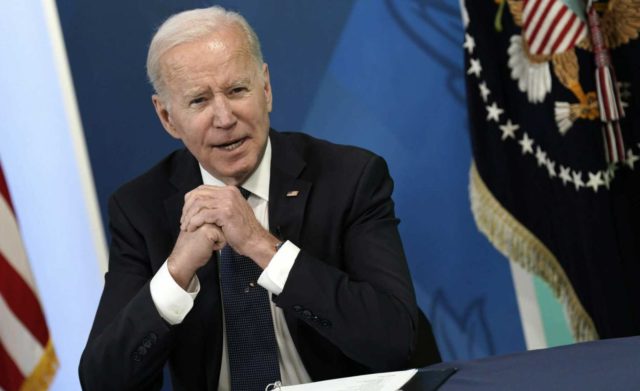
China trying to manipulate US legislation, Biden says Joe Biden. (Yuri Gripas/Abaca Press/TNS)
Last week, President Joe Biden said the Chinese government is lobbying against new legislation that would increase competition against China by bolstering U.S. production of computer semiconductors.
During a visit to a Lockheed Martin factory in Troy, Alabam on Tuesday, Biden voiced support for legislation that he said will “ensure the semiconductors that power the economy and our national security are made here in America again.” Biden also claimed the ruling Chinese Communist Party (CCP) has been lobbying against the bill.
“Today, all — all the world’s most advanced chips are made overseas,” Biden said. “But the events of the past few years have proven beyond a doubt that America’s security should never be held hostage to events overseas — not a pandemic, not a war, not the politics of — ambition, or other countries. Fundamentally, there’s a national — this is a national security issue. This is one of the reasons why the Chinese Communist Party is lobbying folks to oppose this bill. And it’s an issue that unites Democrats and Republicans.”
According to Global Spec, U.S. companies designed about 54 percent of computer chips in the global supply in 2021 but only manufactures about 12 percent of all semiconductors globally. A 2021 report by the Semiconductor Industry Association (SIA), estimates the U.S. will manufacture only about 10 percent of the global semiconductor supply by 2030 if the current trend continues. While the U.S. control over the semiconductor supply has decreased, manufacturing has trended towards China, Taiwan and South Korea.
Bloomberg reported members of both parties support legislation to bolster U.S. semiconductor manufacturing but disagree on some other provisions.
U.S. House of Representatives passed a version of the legislation, known as the United States Innovation and Competition Act (USICA) in February, while the U.S. Senate passed a different version in March. Bloomberg reported the House and the Senate may soon begin a process to reconcile different versions of legislation to boost U.S. semiconductor production, but final passage of the legislation may be months away.
Biden provided few specifics about how the CCP has lobbied against the bill during his Tuesday remarks. People familiar with the matter told Bloomberg that the Chinese Embassy in Washington has been requesting meetings with administration officials, congressional offices, think tanks and companies to gain information about the status of the legislation and what provisions may end up in the final version of the bill for Biden to sign. The sources told Bloomberg that administration officials have all declined the requests, as have many of the congressional offices.
The White House declined a Bloomberg request for more information about Biden’s accusations.
During his remarks last week, Biden added to his case for boosting U.S. semiconductor manufacturing by noting more than 200 semiconductors go into each Javelin anti-tank missile.
“I learned on the tour today that each of the Javelins you produce includes more than 200 semiconductors,” Biden said. “I’ve been a broken record, as the press will tell you, on our need to be able to produce more semiconductors in the United States.”
Biden further described the U.S. need for increased control over the semiconductor supply in light of Russia’s ongoing invasion of Ukraine.
“We are making it as hard as we can for Russia to get a hold of
semiconductors and advanced technologies that it could use to upgrade its military during this conflict, and why we’re taking steps to make it easier to source what we need here in the United States during a global semiconductor shortage,” Biden said.




